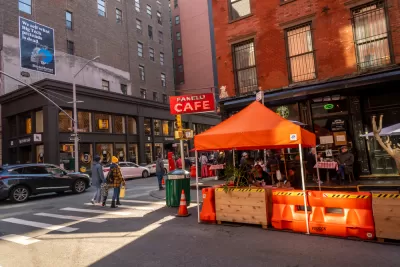A new technology- and data-drive approach to planning could provide direction as society faces challenges of unprecedented scale.

Jason King, associate and parametric design lead at IBI Group, writes about a technological innovation available to the planning profession that will allow informed responses to the novel crises of the COVID-19 pandemic: parametric modeling.
Here is how King describes parametric modeling, for the uninitiated:
The parametric modeling process — which can include the custom development of tools to assist the design of buildings, the planning of transit system and land use plans — enables the efficient use of large datasets and the correlation of variables to approach flexible planning. This unlocks many "what ifs" for a wide range of problems across multiple scales.
According to King, IBI Group is devoting much of its time and energy in developing parametric modeling to support cities responding to the COVID-19 pandemic and its related crises. The article also includes a case study of a parametric model used by the Los Angeles County healthcare system to anticipate operational challenges and also includes a section on holistic approach to data that cities must adopt to realize the potential of parametric modeling.
But before digging into those examples King describes the unprecedented nature of the COVID-19 pandemic, and how it requires a different kind of planning:
Generally speaking, the planning process needs to look for lessons learned in the past to make informed decisions about the future. Depending on the nature of the planning, the timespan from "past to future" can be decades. In the case of COVID-19, however, we are learning about the virus in real time. We do not have decades or even years of precedents to formulate a response. Therefore, pandemic planning processes must be agile with the ability to incorporate continuous uncertainty and change.
FULL STORY: A parametric approach to pandemic resilience

Maui's Vacation Rental Debate Turns Ugly
Verbal attacks, misinformation campaigns and fistfights plague a high-stakes debate to convert thousands of vacation rentals into long-term housing.

Planetizen Federal Action Tracker
A weekly monitor of how Trump’s orders and actions are impacting planners and planning in America.

In Urban Planning, AI Prompting Could be the New Design Thinking
Creativity has long been key to great urban design. What if we see AI as our new creative partner?

King County Supportive Housing Program Offers Hope for Unhoused Residents
The county is taking a ‘Housing First’ approach that prioritizes getting people into housing, then offering wraparound supportive services.

Researchers Use AI to Get Clearer Picture of US Housing
Analysts are using artificial intelligence to supercharge their research by allowing them to comb through data faster. Though these AI tools can be error prone, they save time and housing researchers are optimistic about the future.

Making Shared Micromobility More Inclusive
Cities and shared mobility system operators can do more to include people with disabilities in planning and operations, per a new report.
Urban Design for Planners 1: Software Tools
This six-course series explores essential urban design concepts using open source software and equips planners with the tools they need to participate fully in the urban design process.
Planning for Universal Design
Learn the tools for implementing Universal Design in planning regulations.
planning NEXT
Appalachian Highlands Housing Partners
Mpact (founded as Rail~Volution)
City of Camden Redevelopment Agency
City of Astoria
City of Portland
City of Laramie




























